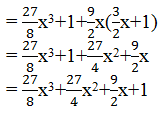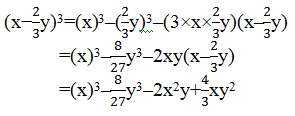NCERT Solutions Class 9 Maths Chapter 2 – Polynomials Exercise 2.5 are given here. These NCERT Maths solutions are created by our subject experts, who make it easy for students to learn. The students use NCERT Class 9 Maths Solutions for reference while solving the exercise problems. The fifth exercise in Polynomials- Exercise 2.5 discusses the Algebraic Identities.
The experts provide a detailed and stepwise explanation of each answer to the questions given in the exercises in the NCERT textbook for Class 9. The NCERT solutions are always prepared by following NCERT guidelines so that it should cover the whole syllabus accordingly. These are very helpful in scoring well in board examinations.
NCERT Solutions for Class 9 Maths Chapter 2- Polynomials Exercise 2.5
Access Other Exercise Solutions of Class 9 Maths Chapter 2- Polynomials
The Exercise wise links for NCERT Class 9 Solutions Maths Chapter 2 are given below.
Exercise 2.1 Solutions 5 Questions
Exercise 2.2 Solutions 4 Questions
Exercise 2.3 Solutions 3 Questions
Exercise 2.4 Solutions 5 Questions
Access Answers to NCERT Class 9 Maths Chapter 2 – Polynomials Exercise 2.5
1. Use suitable identities to find the following products:
(i) (x+4)(x +10)
Solution:
Using the identity, (x+a)(x+b) = x 2+(a+b)x+ab
[Here, a = 4 and b = 10]We get,
(x+4)(x+10) = x2+(4+10)x+(4×10)
= x2+14x+40
(ii) (x+8)(x –10)
Solution:
Using the identity, (x+a)(x+b) = x 2+(a+b)x+ab
[Here, a = 8 and b = −10]We get,
(x+8)(x−10) = x2+(8+(−10))x+(8×(−10))
= x2+(8−10)x–80
= x2−2x−80
(iii) (3x+4)(3x–5)
Solution:
Using the identity, (x+a)(x+b) = x 2+(a+b)x+ab
[Here, x = 3x, a = 4 and b = −5]We get,
(3x+4)(3x−5) = (3x)2+[4+(−5)]3x+4×(−5)
= 9x2+3x(4–5)–20
= 9x2–3x–20
(iv) (y2+3/2)(y2-3/2)
Solution:
Using the identity, (x+y)(x–y) = x2–y 2
[Here, x = y2and y = 3/2]We get,
(y2+3/2)(y2–3/2) = (y2)2–(3/2)2
= y4–9/4
2. Evaluate the following products without multiplying directly:
(i) 103×107
Solution:
103×107= (100+3)×(100+7)
Using identity, [(x+a)(x+b) = x2+(a+b)x+ab
Here, x = 100
a = 3
b = 7
We get, 103×107 = (100+3)×(100+7)
= (100)2+(3+7)100+(3×7)
= 10000+1000+21
= 11021
(ii) 95×96
Solution:
95×96 = (100-5)×(100-4)
Using identity, [(x-a)(x-b) = x2-(a+b)x+ab
Here, x = 100
a = -5
b = -4
We get, 95×96 = (100-5)×(100-4)
= (100)2+100(-5+(-4))+(-5×-4)
= 10000-900+20
= 9120
(iii) 104×96
Solution:
104×96 = (100+4)×(100–4)
Using identity, [(a+b)(a-b)= a2-b2]
Here, a = 100
b = 4
We get, 104×96 = (100+4)×(100–4)
= (100)2–(4)2
= 10000–16
= 9984
3. Factorize the following using appropriate identities:
(i) 9x2+6xy+y2
Solution:
9x2+6xy+y2 = (3x)2+(2×3x×y)+y2
Using identity, x2+2xy+y2 = (x+y)2
Here, x = 3x
y = y
9x2+6xy+y2 = (3x)2+(2×3x×y)+y2
= (3x+y)2
= (3x+y)(3x+y)
(ii) 4y2−4y+1
Solution:
4y2−4y+1 = (2y)2–(2×2y×1)+1
Using identity, x2 – 2xy + y2 = (x – y)2
Here, x = 2y
y = 1
4y2−4y+1 = (2y)2–(2×2y×1)+12
= (2y–1)2
= (2y–1)(2y–1)
(iii) x2–y2/100
Solution:
x2–y2/100 = x2–(y/10)2
Using identity, x2-y2 = (x-y)(x+y)
Here, x = x
y = y/10
x2–y2/100 = x2–(y/10)2
= (x–y/10)(x+y/10)
4. Expand each of the following, using suitable identities:
(i) (x+2y+4z)2
(ii) (2x−y+z)2
(iii) (−2x+3y+2z)2
(iv) (3a –7b–c)2
(v) (–2x+5y–3z)2
(vi) ((1/4)a-(1/2)b +1)2
Solution:
(i) (x+2y+4z)2
Using identity, (x+y+z)2 = x2+y2+z2+2xy+2yz+2zx
Here, x = x
y = 2y
z = 4z
(x+2y+4z)2 = x2+(2y)2+(4z)2+(2×x×2y)+(2×2y×4z)+(2×4z×x)
= x2+4y2+16z2+4xy+16yz+8xz
(ii) (2x−y+z)2
Using identity, (x+y+z)2 = x2+y2+z2+2xy+2yz+2zx
Here, x = 2x
y = −y
z = z
(2x−y+z)2 = (2x)2+(−y)2+z2+(2×2x×−y)+(2×−y×z)+(2×z×2x)
= 4x2+y2+z2–4xy–2yz+4xz
(iii) (−2x+3y+2z)2
Solution:
Using identity, (x+y+z)2 = x2+y2+z2+2xy+2yz+2zx
Here, x = −2x
y = 3y
z = 2z
(−2x+3y+2z)2 = (−2x)2+(3y)2+(2z)2+(2×−2x×3y)+(2×3y×2z)+(2×2z×−2x)
= 4x2+9y2+4z2–12xy+12yz–8xz
(iv) (3a –7b–c)2
Solution:
Using identity (x+y+z)2 = x2+y2+z2+2xy+2yz+2zx
Here, x = 3a
y = – 7b
z = – c
(3a –7b– c)2 = (3a)2+(– 7b)2+(– c)2+(2×3a ×– 7b)+(2×– 7b ×– c)+(2×– c ×3a)
= 9a2 + 49b2 + c2– 42ab+14bc–6ca
(v) (–2x+5y–3z)2
Solution:
Using identity, (x+y+z)2 = x2+y2+z2+2xy+2yz+2zx
Here, x = –2x
y = 5y
z = – 3z
(–2x+5y–3z)2 = (–2x)2+(5y)2+(–3z)2+(2×–2x × 5y)+(2× 5y×– 3z)+(2×–3z ×–2x)
= 4x2+25y2 +9z2– 20xy–30yz+12zx
(vi) ((1/4)a-(1/2)b+1)2
Solution:
Using identity, (x+y+z)2 = x2+y2+z2+2xy+2yz+2zx
Here, x = (1/4)a
y = (-1/2)b
z = 1

5. Factorize:
(i) 4x2+9y2+16z2+12xy–24yz–16xz
(ii ) 2x2+y2+8z2–2√2xy+4√2yz–8xz
Solution:
(i) 4x2+9y2+16z2+12xy–24yz–16xz
Using identity, (x+y+z)2 = x2+y2+z2+2xy+2yz+2zx
We can say that, x2+y2+z2+2xy+2yz+2zx = (x+y+z)2
4x2+9y2+16z2+12xy–24yz–16xz = (2x)2+(3y)2+(−4z)2+(2×2x×3y)+(2×3y×−4z)+(2×−4z×2x)
= (2x+3y–4z)2
= (2x+3y–4z)(2x+3y–4z)
(ii) 2x2+y2+8z2–2√2xy+4√2yz–8xz
Using identity, (x +y+z)2 = x2+y2+z2+2xy+2yz+2zx
We can say that, x2+y2+z2+2xy+2yz+2zx = (x+y+z)2
2x2+y2+8z2–2√2xy+4√2yz–8xz
= (-√2x)2+(y)2+(2√2z)2+(2×-√2x×y)+(2×y×2√2z)+(2×2√2×−√2x)
= (−√2x+y+2√2z)2
= (−√2x+y+2√2z)(−√2x+y+2√2z)
6. Write the following cubes in expanded form:
(i) (2x+1)3
(ii) (2a−3b)3
(iii) ((3/2)x+1)3
(iv) (x−(2/3)y)3
Solution:
(i) (2x+1)3
Using identity,(x+y)3 = x3+y3+3xy(x+y)
(2x+1)3= (2x)3+13+(3×2x×1)(2x+1)
= 8x3+1+6x(2x+1)
= 8x3+12x2+6x+1
(ii) (2a−3b)3
Using identity,(x–y)3 = x3–y3–3xy(x–y)
(2a−3b)3 = (2a)3−(3b)3–(3×2a×3b)(2a–3b)
= 8a3–27b3–18ab(2a–3b)
= 8a3–27b3–36a2b+54ab2
(iii) ((3/2)x+1)3
Using identity,(x+y)3 = x3+y3+3xy(x+y)
((3/2)x+1)3=((3/2)x)3+13+(3×(3/2)x×1)((3/2)x +1)

(iv) (x−(2/3)y)3
Using identity, (x –y)3 = x3–y3–3xy(x–y)

7. Evaluate the following using suitable identities:
(i) (99)3
(ii) (102)3
(iii) (998)3
Solutions:
(i) (99)3
Solution:
We can write 99 as 100–1
Using identity, (x –y)3 = x3–y3–3xy(x–y)
(99)3 = (100–1)3
= (100)3–13–(3×100×1)(100–1)
= 1000000 –1–300(100 – 1)
= 1000000–1–30000+300
= 970299
(ii) (102)3
Solution:
We can write 102 as 100+2
Using identity,(x+y)3 = x3+y3+3xy(x+y)
(100+2)3 =(100)3+23+(3×100×2)(100+2)
= 1000000 + 8 + 600(100 + 2)
= 1000000 + 8 + 60000 + 1200
= 1061208
(iii) (998)3
Solution:
We can write 99 as 1000–2
Using identity,(x–y)3 = x3–y3–3xy(x–y)
(998)3 =(1000–2)3
=(1000)3–23–(3×1000×2)(1000–2)
= 1000000000–8–6000(1000– 2)
= 1000000000–8- 6000000+12000
= 994011992
8. Factorise each of the following:
(i) 8a3+b3+12a2b+6ab2
(ii) 8a3–b3–12a2b+6ab2
(iii) 27–125a3–135a +225a2
(iv) 64a3–27b3–144a2b+108ab2
(v) 27p3–(1/216)−(9/2) p2+(1/4)p
Solutions:
(i) 8a3+b3+12a2b+6ab2
Solution:
The expression, 8a3+b3+12a2b+6ab2 can be written as (2a)3+b3+3(2a)2b+3(2a)(b)2
8a3+b3+12a2b+6ab2 = (2a)3+b3+3(2a)2b+3(2a)(b)2
= (2a+b)3
= (2a+b)(2a+b)(2a+b)
Here, the identity, (x +y)3 = x3+y3+3xy(x+y) is used.
(ii) 8a3–b3–12a2b+6ab2
Solution:
The expression, 8a3–b3−12a2b+6ab2 can be written as (2a)3–b3–3(2a)2b+3(2a)(b)2
8a3–b3−12a2b+6ab2 = (2a)3–b3–3(2a)2b+3(2a)(b)2
= (2a–b)3
= (2a–b)(2a–b)(2a–b)
Here, the identity,(x–y)3 = x3–y3–3xy(x–y) is used.
(iii) 27–125a3–135a+225a2
Solution:
The expression, 27–125a3–135a +225a2 can be written as 33–(5a)3–3(3)2(5a)+3(3)(5a)2
27–125a3–135a+225a2 =
33–(5a)3–3(3)2(5a)+3(3)(5a)2
= (3–5a)3
= (3–5a)(3–5a)(3–5a)
Here, the identity, (x–y)3 = x3–y3-3xy(x–y) is used.
(iv) 64a3–27b3–144a2b+108ab2
Solution:
The expression, 64a3–27b3–144a2b+108ab2can be written as (4a)3–(3b)3–3(4a)2(3b)+3(4a)(3b)2
64a3–27b3–144a2b+108ab2=
(4a)3–(3b)3–3(4a)2(3b)+3(4a)(3b)2
=(4a–3b)3
=(4a–3b)(4a–3b)(4a–3b)
Here, the identity, (x – y)3 = x3 – y3 – 3xy(x – y) is used.
(v) 27p3– (1/216)−(9/2) p2+(1/4)p
Solution:
The expression, 27p3–(1/216)−(9/2) p2+(1/4)p can be written as
(3p)3–(1/6)3−(9/2) p2+(1/4)p = (3p)3–(1/6)3−3(3p)(1/6)(3p – 1/6)
Using (x – y)3 = x3 – y3 – 3xy (x – y)
27p3–(1/216)−(9/2) p2+(1/4)p = (3p)3–(1/6)3−3(3p)(1/6)(3p – 1/6)
Taking x = 3p and y = 1/6
= (3p–1/6)3
= (3p–1/6)(3p–1/6)(3p–1/6)
9. Verify:
(i) x3+y3 = (x+y)(x2–xy+y2)
(ii) x3–y3 = (x–y)(x2+xy+y2)
Solutions:
(i) x3+y3 = (x+y)(x2–xy+y2)
We know that, (x+y)3 = x3+y3+3xy(x+y)
⇒ x3+y3 = (x+y)3–3xy(x+y)
⇒ x3+y3 = (x+y)[(x+y)2–3xy]
Taking (x+y) common ⇒ x3+y3 = (x+y)[(x2+y2+2xy)–3xy]
⇒ x3+y3 = (x+y)(x2+y2–xy)
(ii) x3–y3 = (x–y)(x2+xy+y2)
We know that,(x–y)3 = x3–y3–3xy(x–y)
⇒ x3−y3 = (x–y)3+3xy(x–y)
⇒ x3−y3 = (x–y)[(x–y)2+3xy]
Taking (x+y) common ⇒ x3−y3 = (x–y)[(x2+y2–2xy)+3xy]
⇒ x3+y3 = (x–y)(x2+y2+xy)
10. Factorize each of the following:
(i) 27y3+125z3
(ii) 64m3–343n3
Solutions:
(i) 27y3+125z3
The expression, 27y3+125z3 can be written as (3y)3+(5z)3
27y3+125z3 = (3y)3+(5z)3
We know that, x3+y3 = (x+y)(x2–xy+y2)
27y3+125z3 = (3y)3+(5z)3
= (3y+5z)[(3y)2–(3y)(5z)+(5z)2]
= (3y+5z)(9y2–15yz+25z2)
(ii) 64m3–343n3
The expression, 64m3–343n3can be written as (4m)3–(7n)3
64m3–343n3 =
(4m)3–(7n)3
We know that, x3–y3 = (x–y)(x2+xy+y2)
64m3–343n3 = (4m)3–(7n)3
= (4m–7n)[(4m)2+(4m)(7n)+(7n)2]
= (4m–7n)(16m2+28mn+49n2)
11. Factorise: 27x3+y3+z3–9xyz
Solution:
The expression 27x3+y3+z3–9xyz can be written as (3x)3+y3+z3–3(3x)(y)(z)
27x3+y3+z3–9xyz = (3x)3+y3+z3–3(3x)(y)(z)
We know that, x3+y3+z3–3xyz = (x+y+z)(x2+y2+z2–xy –yz–zx)
27x3+y3+z3–9xyz = (3x)3+y3+z3–3(3x)(y)(z)
= (3x+y+z)[(3x)2+y2+z2–3xy–yz–3xz]
= (3x+y+z)(9x2+y2+z2–3xy–yz–3xz)
12. Verify that:
x3+y3+z3–3xyz = (1/2) (x+y+z)[(x–y)2+(y–z)2+(z–x)2]
Solution:
We know that,
x3+y3+z3−3xyz = (x+y+z)(x2+y2+z2–xy–yz–xz)
⇒ x3+y3+z3–3xyz = (1/2)(x+y+z)[2(x2+y2+z2–xy–yz–xz)]
= (1/2)(x+y+z)(2x2+2y2+2z2–2xy–2yz–2xz)
= (1/2)(x+y+z)[(x2+y2−2xy)+(y2+z2–2yz)+(x2+z2–2xz)]
= (1/2)(x+y+z)[(x–y)2+(y–z)2+(z–x)2]
13. If x+y+z = 0, show that x3+y3+z3 = 3xyz.
Solution:
We know that,
x3+y3+z3-3xyz = (x +y+z)(x2+y2+z2–xy–yz–xz)
Now, according to the question, let (x+y+z) = 0,
then, x3+y3+z3 -3xyz = (0)(x2+y2+z2–xy–yz–xz)
⇒ x3+y3+z3–3xyz = 0
⇒ x3+y3+z3 = 3xyz
Hence Proved
14. Without actually calculating the cubes, find the value of each of the following:
(i) (−12)3+(7)3+(5)3
(ii) (28)3+(−15)3+(−13)3
Solution:
(i) (−12)3+(7)3+(5)3
Let a = −12
b = 7
c = 5
We know that if x+y+z = 0, then x3+y3+z3=3xyz.
Here, −12+7+5=0
(−12)3+(7)3+(5)3 = 3xyz
= 3×-12×7×5
= -1260
(ii) (28)3+(−15)3+(−13)3
Solution:
(28)3+(−15)3+(−13)3
Let a = 28
b = −15
c = −13
We know that if x+y+z = 0, then x3+y3+z3 = 3xyz.
Here, x+y+z = 28–15–13 = 0
(28)3+(−15)3+(−13)3 = 3xyz
= 0+3(28)(−15)(−13)
= 16380
15. Give possible expressions for the length and breadth of each of the following rectangles, in which their areas are given:
(i) Area : 25a2–35a+12
(ii) Area : 35y2+13y–12
Solution:
(i) Area : 25a2–35a+12
Using the splitting the middle term method,
We have to find a number whose sum = -35 and product =25×12=300
We get -15 and -20 as the numbers [-15+-20=-35 and -15×-20=300]
25a2–35a+12 = 25a2–15a−20a+12
= 5a(5a–3)–4(5a–3)
= (5a–4)(5a–3)
Possible expression for length = 5a–4
Possible expression for breadth = 5a –3
(ii) Area : 35y2+13y–12
Using the splitting the middle term method,
We have to find a number whose sum = 13 and product = 35×-12 = 420
We get -15 and 28 as the numbers [-15+28 = 13 and -15×28=420]
35y2+13y–12 = 35y2–15y+28y–12
= 5y(7y–3)+4(7y–3)
= (5y+4)(7y–3)
Possible expression for length = (5y+4)
Possible expression for breadth = (7y–3)
16. What are the possible expressions for the dimensions of the cuboids whose volumes are given below?
(i) Volume : 3x2–12x
(ii) Volume : 12ky2+8ky–20k
Solution:
(i) Volume : 3x2–12x
3x2–12x can be written as 3x(x–4) by taking 3x out of both the terms.
Possible expression for length = 3
Possible expression for breadth = x
Possible expression for height = (x–4)
(ii) Volume:
12ky2+8ky–20k
12ky2+8ky–20k can be written as 4k(3y2+2y–5) by taking 4k out of both the terms.
12ky2+8ky–20k = 4k(3y2+2y–5)
[Here, 3y2+2y–5 can be written as 3y2+5y–3y–5 using splitting the middle term method.]= 4k(3y2+5y–3y–5)
= 4k[y(3y+5)–1(3y+5)]
= 4k(3y+5)(y–1)
Possible expression for length = 4k
Possible expression for breadth = (3y +5)
Possible expression for height = (y -1)













Thank you!
Thank you for this
This is helpful
I like this app whole information I got
Nice app
Excellent it is really very helpful for doubt solving
Very Helpful 🙂 !!
Thank you for this
And this is most helpful for us
It is very helpful thankyou so much
Thanks BYJU’S is very helpful 😊
Thanks ✨🦋👀